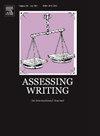二语写作表现的语言预测因素:不同体裁的差异
IF 5.5
1区 文学
Q1 EDUCATION & EDUCATIONAL RESEARCH
引用次数: 0
摘要
本研究调查了语言复杂性(包括词汇和句法复杂性)、准确性和流畅性(CAF)如何预测第二语言(L2)写作分数,涉及四种散文类型:叙述、阐述、阐述论证和论证。在相同的主题上,收集了大约60篇关于这些类型的文章,并使用整体标题进行评分。对语言的复杂性、准确性和流畅性进行了八项测试。对各类型进行基于赤池信息标准修正(AICC)的正逐步回归分析。研究结果显示,CAF解释了大量的分数差异:辩论任务为61 %,其他三个任务约为70 %。在叙述和说明性任务中,流利性被发现是一个非常重要的得分预测指标,而在说明性论证和论证任务中,词汇的复杂性与流利性同样重要,甚至更重要。在句法复杂性预测因子方面,叙事性任务的回归模型也不同于说明性、议论文型任务。词汇多样性在预测分数方面的重要性通常低于词汇复杂程度。研究结果对第二语言写作评分和自动作文评分的影响进行了讨论。本文章由计算机程序翻译,如有差异,请以英文原文为准。
Linguistic predictors of L2 writing performance: Variations across genres
This study investigated how linguistic complexity (including lexical and syntactic complexity), accuracy, and fluency (CAF) predicted second language (L2) writing scores across four essay genres: narration, exposition, expo-argumentation and argumentation. Approximately 60 essays were collected on each of these genres on the same subject matter and were scored using a holistic rubric. Eight measures of complexity, accuracy and fluency were examined. Forward stepwise regression analysis based on Akaike Information Criterion Corrected (AICC) was conducted for each genre. The findings revealed a large amount of score variance explained by CAF: 61 % for the argumentative task and about 70 % for the other three tasks. Fluency was found to be a highly important score predictor for the narrative and expository tasks, while lexical sophistication was equally important or more important than fluency for the expo-argumentative and argumentative tasks. The regression model for the narrative task also differed from those for the expository, argumentative task types, regarding syntactic complexity predictors. Lexical diversity was generally less important in predicting scores than lexical sophistication. The implications of the findings for L2 writing scoring and automated essay scoring are discussed.
求助全文
通过发布文献求助,成功后即可免费获取论文全文。
去求助
来源期刊

Assessing Writing
Multiple-
CiteScore
6.00
自引率
17.90%
发文量
67
期刊介绍:
Assessing Writing is a refereed international journal providing a forum for ideas, research and practice on the assessment of written language. Assessing Writing publishes articles, book reviews, conference reports, and academic exchanges concerning writing assessments of all kinds, including traditional (direct and standardised forms of) testing of writing, alternative performance assessments (such as portfolios), workplace sampling and classroom assessment. The journal focuses on all stages of the writing assessment process, including needs evaluation, assessment creation, implementation, and validation, and test development.
 求助内容:
求助内容: 应助结果提醒方式:
应助结果提醒方式:


